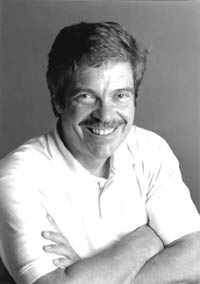|

Dr.
Alan Kay: Father Of The PC
By
Tom Kertes
“Children
are the messages we send to the future,” said Dr. Alan C. Kay
in his intensely inspirational Lynford Lecture at Polytechnic
University. “So whenever we’re talking about the real future,
we must talk about kids. Because what they learn, and what they
consider to be normal, becomes most of what humanity winds up
doing.”
Dr. Kay’s was the fourth in the series of annual lectures by leading
scientists at the school. Currently the President of Viewpoints
Research Institute Inc., he was uniquely qualified to be the next
member of this illustrious group. “He is not only a pioneer in
the development of the personal computer, but is also the architect
of the Graphic User Interface, modern object-oriented programming,
and many other major inventions”, Mr. Jeffrey Lynford, Polytechnic
University Trustee, said in his introductory remarks. “Perhaps
equally importantly, his deep interest in children and education
were the catalysts for these ideas. Dr. Kay has focused his considerable
intellect at the point where computer technology and learning
intersect.”
Indeed, long before the world understood the importance of computer
literacy being initiated in the public school classroom, Dr. Kay
was working on software essential to accomplish this very objective.
“I have spent much of my career defining and enhancing the relationship
between children and the computer,” he said.
“It
all began in the 1950s when Jean Piaget, the Swiss developmental
scientist, rewrote educational theory by watching children learn,”
Dr. Kay added. What appeared to adults as mere “play” up to that
point, was actually the way children acquired knowledge. “This
implied to me that the computer and its software could be an important
‘transitional object for children,” Dr. Kay said.
The most significant characteristic of transitional phenomena
is not the object itself but the nature of the relationship to
the object. Thus the goal was “to link a child’s natural desire
to fantasize and learn from experimentation with the computer’s
power to simulate potentially anything,” according to Dr. Kay.
Computers would also promote the development of a different type
of thinking. As an illustration, Dr. Kay used an informal 1991
study, wherein 21 of 23 questioned Harvard graduates reasoned
that “the weather has different seasons due to the earth’s elliptical
movement around the sun.” “They clearly had knowledge of certain
scientific facts,” Dr. Kay said. “But they were unable to conceptualize
and think beyond those facts.”
Dr. Kay analogized the essential impact of the PC to the invention
of the printing press. “There have been manuscripts around since
3500 B.C.,” he said. “But it was Gutenberg’s Bible and, in 1500,
the Venetian scientist Aldis’ invention of the appropriate book
size that shaped arguments and began to formulate a different
type of thinking.”
“That
was the first time books could be lost. And it would be
no big deal – you’d just get another one,” said Kay. “Indeed,
that’s one of the ways we know that the real computer revolution
hasn’t happened yet,” he concluded. “When we can start to lose
our computers without a major financial impact, we’ll be closer
to the promised land.” However, that eventuality is not likely
to happen in my lifetime.
Education Update, Inc., P.O. Box 20005, New York, NY 10001. Tel:
(212) 481-5519. Fax: (212) 481-3919. Email: ednews1@aol.com.
All material is copyrighted and may not be printed without express consent of
the publisher. © 2001.
|

